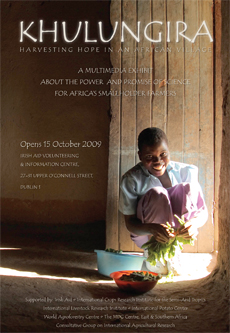Collaborative agricultural research in Africa gets a welcome boost; village farm household in central Malawi (photo credit: ILRI/Mann).
In recent months, an, initiative of the Consultative Group on International Agricultural Research (CGIAR) called the Regional Plan for Collective Action in Eastern & Southern Africa (now simply called the ‘Regional Collective Action’) updated its ‘CGIAR Ongoing Research Projects in Africa Map’: http://ongoing-research.cgiar.org/ This collaborative and interactive map will be launched in the coming weeks through fliers, displays and presentations at agricultural, research and development meetings that have Africa as a focus. Although much of Africa’s agricultural research information has yet to be captured in this map, 14 centres supported by the CGIAR have already posted a total of 193 research projects and much more is being prepared for posting.
The newsletter of the Regional Collective Action—Collective Action News: Updates of agricultural research in Africa—continues to elicit considerable interest and feedback. Recent issues reported on the CGIAR reform process (November 2009) and agriculture and rural development at the recent climate change talks in Copenhagen (December 2009). The January 2010 issue reflects on the achievements of the Regional Collective Action since its inception three years ago (https://www.ilri.org/regionalplan/documents/Collective Action News January 2010.pdf).
Several high-profile African networks, including the Forum for Agricultural Research in Africa (FARA), the Food, Agriculture and Natural Resources Policy Analysis Network (FANRPAN) and the Association for Strengthening Agricultural Research in Eastern and Central Africa (ASARECA), are helping to disseminate the newsletter of the Regional Collective Action as well as information about its consolidated multi-institutional research map. Coordinators have now been appointed to lead each of four flagship programs of the Regional Collective Action.
Flagship 1 conducts collaborative work on integrated natural resource management issues and is coordinated by Frank Place at the World Agroforestry Centre (ICRAF).
Flagship 2 conducts research on agricultural markets and institutions and is led by Steve Staal of ILRI.
Flagship 3 conducts research on agricultural and related biodiversity and is led by Wilson Marandu of Bioversity International with support from Richard Jones of the International Crops Research Institute for the Semi-Arid Tropics (ICRISAT).
Flagship 4 conducts research on agriculturally related issues in disaster preparedness and response and is led by Kate Longley and Richard Jones of ICRISAT.
These four flagships programs of the Regional Collective Action are expected to play crucial roles in advancing collaborative discussions and activities in the new CGIAR, which is transforming itself to better link its agricultural research to development outcomes. ILRI’s Director of Partnerships and Communications, Bruce Scott, represented the CGIAR Centres at the December Meeting of the ASARECA Board of Trustees.
‘ASARECA continues to value the work of the CGIAR Centres in this region and welcome the Regional Collective Action,’ Scott said. With the four Flagship Programs off and running, the interactive Regional Research Map live on the web, and Collective Action News reporting on regional agricultural issues regularly, collaborative agricultural science for development in Africa appears to have got a welcome boost.




